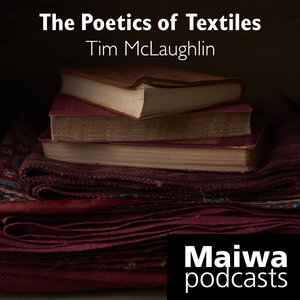 New Podcast Uploaded
New Podcast UploadedExcerpts from
Masters of the Art
The Khatri Blockprinters of Dhamadka and Ajrakhpur
Part 2 - Question and Answer
Razzaque Mohammed Khatri and Ismail Mohammed Khatri
with Eiluned Edwards
In this episode Razzaque and Ismail field questions from the audience. The questions explored trade patterns, the technique and culture of blockcutting, how the excavated textiles from Fustat, Egypt have found their way back into contemporary Ajrakh designs, tradition and the future of the art.
Razzaque Mohammed Khatri
Razzaque is the eldest son of Mohammed Siddique Khatri, a traditional ajrakh printer who won the national award for craft in 1981. Razzaque was to follow in his father’s footsteps, winning the national award himself in 1998. Razzaque has participated in numerous international exhibitions and workshops, achieving high honours wherever his blockprints are shown. In addition to his national award, he has also received two National Merit Certificates. He continues the tradition by training his sons in the family art, which can be traced back nine generations.
Dr. Ismail Mohammed Khatri
Ismail was also taught the family art by his father, and his work has been acclaimed internationally. In 2002 he presented workshops and lectures at the Iowa Color Congress; in 2003 he was awarded an honourary doctorate from De Montfort University, Leicester, UK. Also in 2003 Ismail participated in the Resurgence Exhibition of the Manly Council in Australia, showcasing work specially designed to reflect the post-earthquake situation. Both brothers attended the UNESCO conference on Natural Dyes held in Hyderabad, India, in 2006.



 "When asked by a reporter how one could understand India, Gandhi replied, "Study her villages." – and so we do. Over the past decades Maiwa has committed itself to ethical trade and craft practices. Our business mandate is to trade directly with the individual craftspeople, thereby offering the full value of the work to the creator. We've established many successful partnerships and continue to develop more with emerging artisans. By offering translation, training, and resources both locally and abroad Maiwa forms a bridge between consumer and craftsperson.
"When asked by a reporter how one could understand India, Gandhi replied, "Study her villages." – and so we do. Over the past decades Maiwa has committed itself to ethical trade and craft practices. Our business mandate is to trade directly with the individual craftspeople, thereby offering the full value of the work to the creator. We've established many successful partnerships and continue to develop more with emerging artisans. By offering translation, training, and resources both locally and abroad Maiwa forms a bridge between consumer and craftsperson. "In many parts of the world cloth is used to sanctify rites of passage. In Indonesia, batik is revered as sacred cloth. It is a vehicle for meditation. The saffron robes of buddhist monks are ritually dyed to maintain their soft yet vibrant colour. The meanings of complex and sophisticated textiles from India are as ancient as its civilizations. The symbolism of cloth reaches deeply into all of Indian life.
"In many parts of the world cloth is used to sanctify rites of passage. In Indonesia, batik is revered as sacred cloth. It is a vehicle for meditation. The saffron robes of buddhist monks are ritually dyed to maintain their soft yet vibrant colour. The meanings of complex and sophisticated textiles from India are as ancient as its civilizations. The symbolism of cloth reaches deeply into all of Indian life. 








